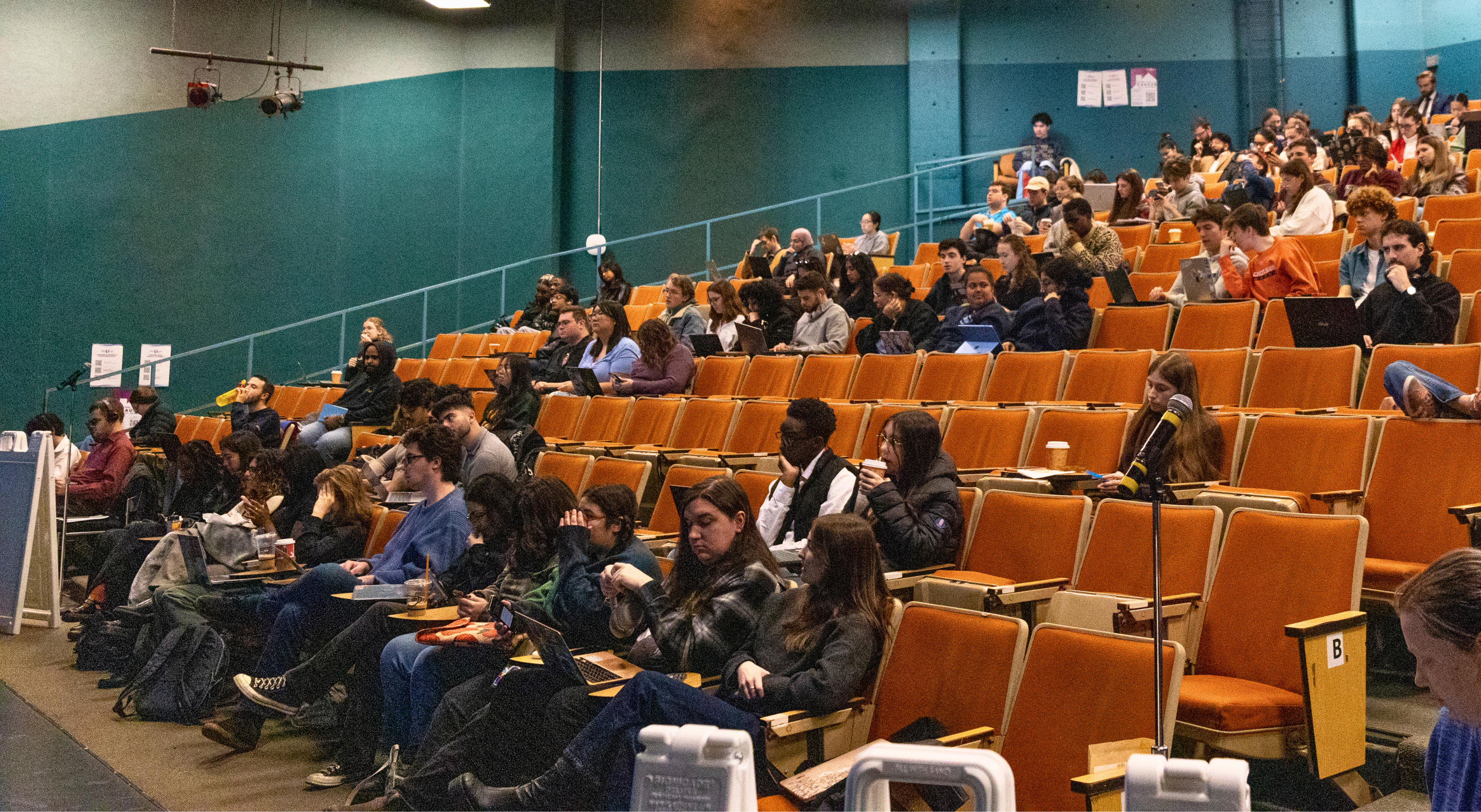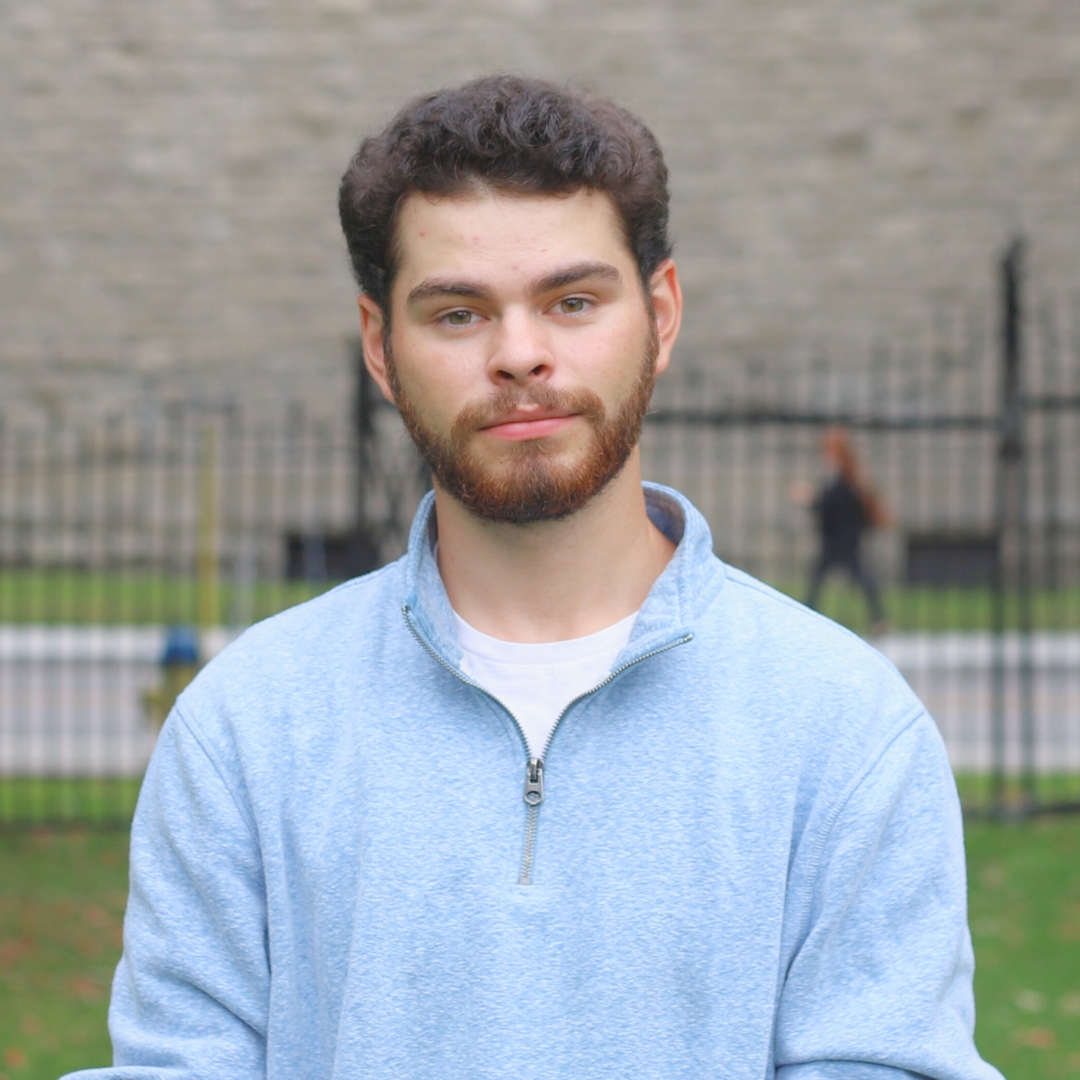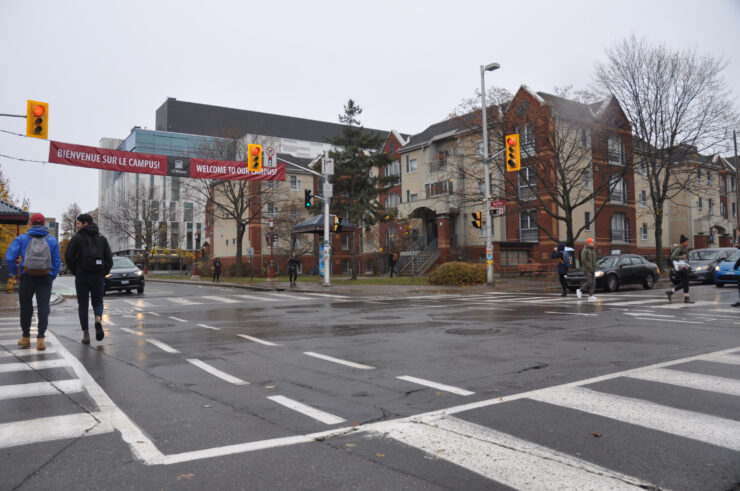STUDENTS EXUBERANT AS MEETING TOOK UNDER 10 HOURS TO FINISH
Attendees of the University of Ottawa Students’ Union (UOSU) Autumn General Assembly (AGA) once again spilled into the frigid depths of the UCU basement’s Alumni Auditorium on Nov. 17 to utilize their constitutional rights as UOSU members to participate in the bi-annual general assembly.
Students, club executives, and board members were content as the meeting began just 38 minutes later than scheduled, a whole 15 minutes earlier than the previous year.
Chair of the Board of Directors (BOD) Maya Sinclair apologized for the technical difficulties, as both she and UOSU president Delphine Robitaille thanked attendees for their patience and for choosing to spend their Sunday with them. Live translation services were also made available through a QR code leading to a website.
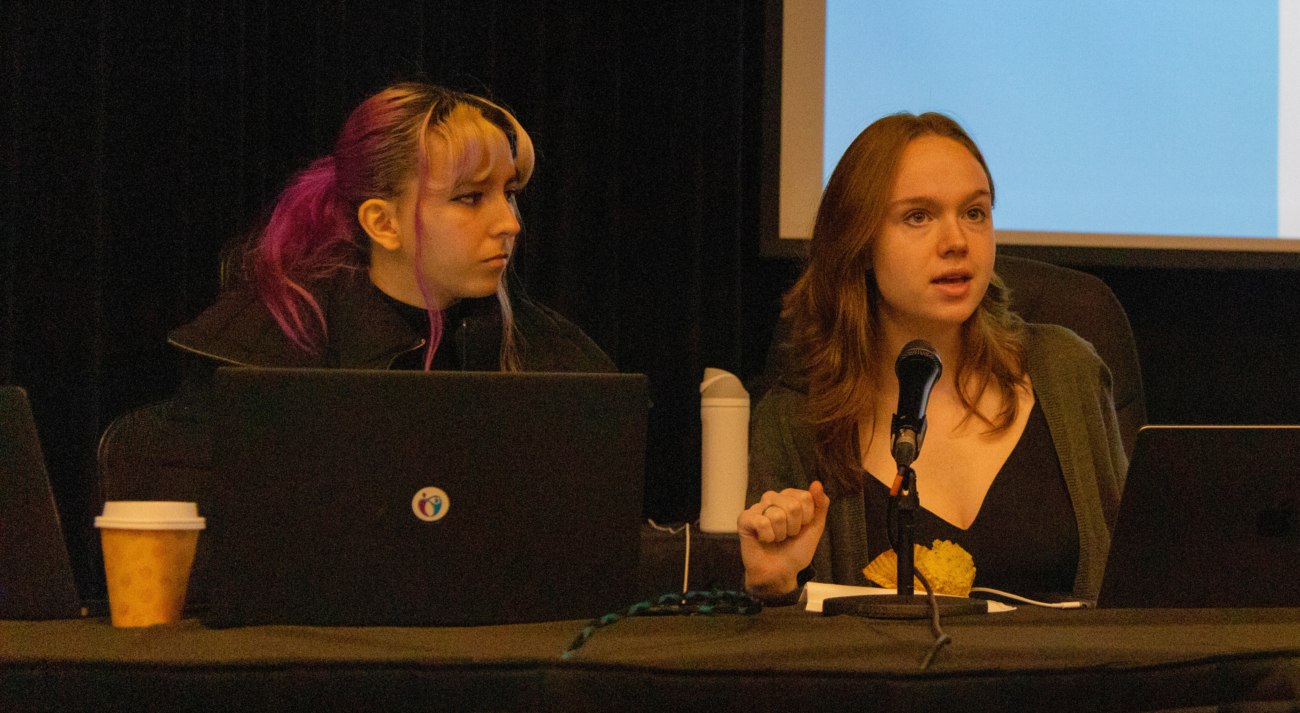
What may have initially looked like a straightforward agenda to some turned out to be just as controversial as past assemblies, as debates on motions sometimes neared or surpassed an hour, on occasion spurring a motion to end discussion and skip to a vote.
Ironically, arguably the most impactful news from Sunday was almost completely unrelated to the agenda items and came during the question and answer period following the executive committee’s updates.
When asked about possible refunds to U-Pass holders for service disruptions throughout the first semester, Robitaille revealed that OC Transpo is attempting to circumvent their current U-Pass agreement that allows for 2.5 per cent increases per year. The union received a letter this week demanding a five per cent increase.
By-election results were approved with no debate; the yearly audit was approved — with an amendment from Daniel Thorp focused on Canada Not-for-Profit Corporations Act (CNCA) compliance — and interim operations commissioner Greg Coleman’s motion to appoint Logan-Katz as the union’s public accountant passed (a departure from Henry-Ward).
Amendments to the constitution that had been put forth by the Board of Directors (BOD) over the past few months were passed, with an amendment from Thorp to include constitutional amendments that had been previously approved by the BOD but were accidentally omitted from the motion presented for the GA.”
After a quick break for lunch, the real debates started at around 2:30 p.m., with Annex E (Updates to the Position Book) up first.
Updates to the Position Book — Annex E
The UOSU’s Position Book outlines its stance on social or political issues, guiding advocacy campaigns. Adopted by the GA, they can be temporarily approved by the Board of Directors and must be reviewed at a GA every three years.
This assembly, two positions were up for renewal: POS-13: Solidarity with Uyghur Muslims, and POS-14: Solidarity with Palestine.
Maisy Elspeth — the union’s former advocacy commissioner — brought forward an amendment that called upon the union to also establish stances on 21 other geopolitical issues, in addition to the two currently in the book and up for renewal.
Elspeth argued that the union should take a proactive approach to these issues, rather than a “historically reactive approach,” and included a deadline of the Winter General Assembly (WGA), held annually in March.
Sub-amendments to this motion passed, changing the timeline to the 2025 Autumn General Assembly, and also one that added “hedge funds” and “NATO expansionism” to the list of geopolitical conflicts for the Union to proactively take a stance on.
A handful of students came out against the motion, with most citing either the feasibility of developing positions on complex issues in a short timeframe, or the burden it would place on Alex Stratas’s portfolio (the incoming advocacy commissioner).
“I don’t think this is accomplishable,” said Stratas, who was elected in the recent by-elections. “[these positions] would take up so much time that students would not appreciate.”
Coleman (speaking as a student, and not in his role as operations commissioner) argued that while the issues on the amendment were a good starting point, he was wary of “over-promising” students, or “having these positions but not having done the research necessary” in such a short time frame, even when extended to the fall.
Elspeth agreed that the timeline was “absurd,” but held that “human rights is difficult,” and offered to amend the motion to only five conflicts from the original list of 21 for the WGA.
Phoebe Qiao asserted that the experiences of affected groups — e.g. Sikhs in India — are different from the realities of diaspora communities in Canada. “As a Chinese person, I agree on the three positions proposed here on the Chinese government,” said Qiao. “But as a diaspora, my … main concern is [that of] sinophobia, anti-Asian hate.” Qiao further asked, “who is this helping?”
Responding to Qiao, Elspeth contended that UOSU’s positions have been immensely reactionary in the past, and the positions are broad enough that they are open to student consultation and feedback. She asserted that taking a proactive approach, rather than specific students or groups bringing forward these positions would help students.
“This motion is not really representative,” said deputy student life commissioner Deborah Duroseau (noting that she was not speaking as a hired employee, but a student) arguing the amendment would give Stratas her “agenda” for her term.
“An advocacy commissioner is elected because of views they have already expressed,” said Duroseau, further arguing that advocacy commissioners should come up with stances like these themselves rather than being handed positions upon their election.
Upper-year student Carly Fox claimed Elspeth’s amendment was “undemocratic,” arguing the need to recognize students’ autonomy to put forth their own positions.
Thorp spoke in favour of the amendment, arguing “if we’re only bringing positions from students that are affected the most, we’re not getting various different perspectives.”
Elspeth finished by asserting that the “realities of students who have families back home” do not always line up with the issues that make mainstream news. “Consultation is super important, and a lot of these issues haven’t been talked about, and that’s part of the problem.”
Nicolas Michaud called to end debate, and the amendment was put to a vote. The amendment was defeated with 85 votes against, 24 votes for, and 21 abstentions. The original motion, to renew the two existing positions only, passed with 70 votes for, 18 votes against, and 13 abstentions.
MOTION A — Mandate Police Record Checks for All 101 Week Guides
Reaching the first motion just before 3:30 p.m. — almost six hours after the assembly was called to order — the motion to mandate police record checks for 101 Week guides was up for debate.
Daniel Thorp, the motion’s author, began by saying that “no specific incident spurred this [motion] on” but that he felt that the motion was “important to protect students.” The proposed motion would require all guides for 101 Week — run by the various executives of Registered Student Governments (RSGs) — to submit a vulnerable sector check before volunteering for 101 Week.
Amendments were passed, excluding individuals under the age of 18 and those with valid government security clearances from the requirement.
Two main arguments were raised against the motion.
The first was the logistical issues of when the deadline to provide the check was decided to be, and its effect on the feasibility of hosting specific welcome week events due to the risk of not having a sufficient number of guides.
The second was the risk of mandating marginalized people to interact with police.
Thorp answered questions about the feasibility of international or out-of-province volunteers receiving their checks in a timely manner by reassuring the assembly that Ottawa Police Service record checks are free for volunteering purposes and “do not take long to process.”
VP of communications for the ISA and faculty of social sciences board member, Angel Geneau, pushed back against the motion, saying she doesn’t want to “send a vulnerable group that is susceptible to police brutality” to a police station.
Geneau said that many guides who would’ve otherwise participated in the ISA’s 101 Week would be deterred by the mandatory record check. She also asserted that the motion’s passage would “jeopardize UOSU’s ‘decolonizing’ position.”
Thorp conceded that the argument for safety concerns of Indigenous guides was the best argument he heard against the motion, acknowledging “there is nuance to it.” Ethan Rolando Dolcino then proposed an amendment to the motion that would specifically exempt Indigenous people from the requirement.
Other speakers then debated the amendment, with some pointing out that other marginalized groups may also feel uncomfortable interacting with police to obtain their record checks. Geneau acknowledged the good intentions of the amendment but also pointed out the issue of defining who is and is not Indigenous. That amendment failed with 11 votes for, 88 against, and 15 abstentions.
The amendment was defeated, and the motion was called to a vote soon after. Motion A was shot down resoundingly, with 83 against, 18 abstentions, and 14 in favour.
MOTION B — Francophone Centre
Though many believed the creation of a UOSU Francophone Centre could be a subject of contentious debate, two participants, one being Duroseau (again noting she was speaking as a student), spoke against the motion, citing the other campus resources available for Francophone students such as the university’s Francophone centre.
Another asked those in favour of the motion to explain how the proposed Francophone Centre would increase campus participation in Francophone initiatives. The Bilingualism Centre — a UOSU-funded service — was shut down during the 2024 budget cuts with Robitaille citing “under-utilization.”
Nicolas Michaud, speaking in favour of the motion, answered Deborah’s concerns by differentiating the current university-led initiatives from the proposed union-led initiative. “We [students] know better than the university how to put on events, in both French and English,” said Michaud.
The motion passed with 65 votes in favour, 21 against, and 12 abstentions.
MOTION C — Motion to Advocate for Student-Imposed Elective Pass/Fail Grading
Noting that a handful of other Canadian universities (UBC, U of T, York, and Carleton) currently have student-imposed elective pass/fail grading systems on their books, Callum McKinnon called upon UOSU to advocate for the concept.
A Williams amendment passed changing the wording of the motion to “permitted” faculties (after a Sam Montgomery sub-amendment was adopted). Then, a Thorp amendment passed that recognized the discrepancies in the number of electives between faculties and called for the policy to extend to all courses, with a limit per semester.
Ethan Rolando Dolcino’s sub-amendment to allow SASS students to bypass the semester limit passed. Finally, the motion, with the amendments, was adopted with 65 votes for, 12 against, and 18 abstentions.
Shortly after Motion B was passed, at around 6:20 p.m., Sinclair informed participants that the assembly had lost quorum — which meant that no further motions could be debated or voted on. UOSU’s constitution requires at least 50 people to be present in-person to maintain quorum at a GA.
A mad scramble ensued, wherein the remaining participants phoned their friends and messaged group chats to bring the assembly back into quorum, which was achieved just before 6:45 p.m.
MOTION D — Accessibility Budget Statement
Rolando Dolcino’s own motion was next. It called upon the union to “define accessibility for individuals with disabilities as identifying and removing any barriers, of any kind, that directly or indirectly arise from a disability,” and asked the union to create an accessibility budget.
Rolando Dolcino substantially modified the substance of the motion with an amendment from the floor. The amendment called for the union to also create a caucus in collaboration with the Centre for Students with Disabilities that would hold bi-monthly meetings on the accessibility issues, and that a “French first, then English” policy be adopted by the caucus.
The amendment was adopted, and the motion passed with 55 votes for, 8 against, and 21 abstentions.
MOTION E — Updating Bilingualism Requirements for UOSU Executives
Due to UOSU’s struggles with electing and maintaining a full executive committee, a motion was brought forward by Matthew Yorke Gambhir, which called upon the union to reduce bilingualism requirements for all UOSU executives — except the Francophone commissioner.
Previous requirements for an executive position required scores of three out of four on a university-administered language test in the categories of listening, speaking, writing, and reading. Candidates fluent in an Indigenous language native to North America are only required to pass either the French or English test. Yorke Gambhir’s motion called upon the UOSU to reduce standards to two out of four on the same language test.
One of many amendments proposed was from Rolando Dolcino, who brought forward one that would do away entirely with bilingualism requirements, instead giving certified-bilingual students a “bonus,” in the form of a doubled vote tally during elections. This failed decidedly, with 12 votes for, 59 against, and 14 abstentions.
Marème Diongue proposed an amendment that would replace the text of the original motion. Bilingualism requirements for elections would remain, but in case of a vacant executive committee role, candidates would be selected based on their qualifications even if the bilingual requirements are not met — as long as the candidate makes an effort to “learn and try to communicate” in their second language.
This amendment passed with 79 votes for, six against, and two abstentions, along with a friendly amendment adding “[D]uring the hiring process, preference will be given to bilingual candidates,“ to the UOSU’s constitution.
Ultimately, the resulting motion was wholly different than Yorke Gambhir’s original motion. Because the motion was an amendment to the constitution, it required three-quarters of the members present at the assembly to approve it. After much deliberation and many proposed amendments, the final motion ultimately fell short of that threshold with 47 votes for 36 against, and six abstentions.
Executive Committee Updates
Before debate on motions got underway, the executive committee provided updates on their mandates since the last WGA in March. Robitaille called attention to the small executive team (meaning some worked on initiatives outside the scope of their mandates) and gave recognition to all executive office members who had supported them in that process.
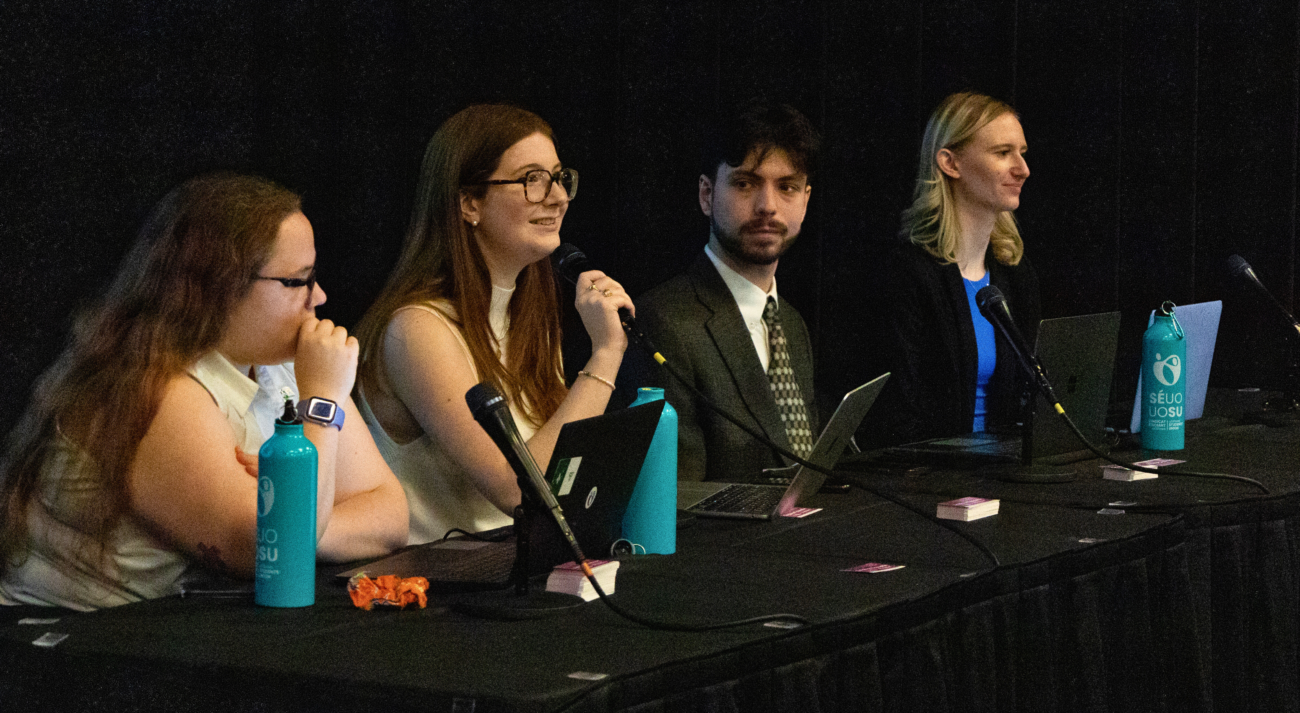
Imani Bunzigiye, who was appointed interim equity commissioner on Jan. 1 and elected equity commissioner at the general elections last spring, resigned before the AGA. No updates were given on the equity commissioner’s portfolio.
At a BOD meeting the day before the AGA, a Sexual Violence Prevention and Response policy was brought forward by Robitaille and passed. Versions of the policy had been brought forward multiple times over the past few months unsuccessfully.
Following their updates, executives answered questions from attendees which can be found on our Twitter.
Delphine Robitaille — President
Following an 11.37 per cent budget cut, Robitaille said the team worked hard to restructure internal departments. The president, who has now served for more than a year in the role, cited the union’s new emergency hardship fund and the $90,000 received in external funding from partners, including the U of O and Chartwell’s dedication towards the UOSU Food Bank, as her proudest achievements as of late.
Robitaille also talked about leading UOSU’s response to the pro-Palestine encampment on Tabaret Lawn, specifically the process of amplifying student voices and facilitating negotiations while meeting with the U of O and organizers about safety and logistics.
Helming the portfolio of advocacy commissioner following the resignation of Sanjida Flora in July, Robitaille cited recent advocacy for better LRT service, the support of student voices following the university’s withdrawal from Capital Pride, the Safer Together campaign, and the recent support of APUO through their labour relations as major initiatives she has been working on.
Greg Coleman — Interim Operations Commissioner
Greg Coleman — appointed as interim operations commissioner on May 6. — described his work as happening “mostly in the background.” Coleman worked with Robitaille on drafting and presenting the budget, which he described as a “very hard” one.
Coleman also recounted working with Williams to address persistent club funding issues, which was ultimately addressed with the largest club funding purse in union history. Coleman listed club funding as his biggest day-to-day task, as he moved towards making it “smoother [and] more standardized [to giv[e] students [the] value [they] deserve.”
Daphnée Veilleux-Michaud — Francophone Affairs Commissioner
Daphnée Veilleux-Michaud gave her updates in French. The Francophone affairs commissioner spoke about French-language speaking roundtables taking place every two weeks and union visibility outside the university community as ongoing commitments.
Veilleux-Michaud also talked about helping to plan an emergency meeting about the closure of the Bilingual Centre prior to the June budget being approved; meeting with various Francophone organizations at other post-secondary institutions; and restructuring the commissioner portfolio to ensure that the position’s work remains relevant over the next few years.
Also chair of the elections committee that monitored the recent by-election, Veilleux-Michaud gave recognition to previous chair Bianca Miron and campus club uOVotez for their help, as this year marked the highest turnout in a by-election in UOSU’s short history at 8.47 per cent.
Sydney Williams — Student Life Coordinator
Though not a member of the small executive committee, Williams spoke due to her support of the team since her appointment as the student life coordinator. Williams spoke about the success of this year’s 101 Week, which she described as the “biggest in UOSU history.”
Along with Coleman, Williams also helped to address club funding issues. Williams noted that the 425 current clubs recognized by the union are the most at any Canadian university. Almost $400,000 is set to be distributed to clubs this year after a $4.99 club funding levy passed in last year’s fall by-election.
Williams talked about working to introduce or update club policies and oversaw the introduction of the new clubs portal to ensure smoother, more consistent, and more effective policies. Her tenure as the student life coordinator concluded following the AGA.
The UOSU’s Winter General Assembly will take place in March and with an APUO strike on the table, there is potential to be much more charged. Stay tuned to the Fulcrum’s and the UOSU’s Instagram page for updates on board meetings until then.
- With files from Isabelle Jay.
- Editor’s Note: The passage about the Francophone Centre was edited to reflect that there were two speakers who spoke against the motion at 4:56 p.m.
- Editor’s Note: At 6:06 p.m., the following edits were made. The name of the accountant was misspelled as “Henry-Ward” and was corrected. Angel Geneau’s title was corrected from co-president of the ISA to VP of communications, and her role as a board member for the faculty of social sciences was added. A disclaimer was added to Greg Coleman and Deborah Duroseau’s speaking points that they were speaking as students, not in their UOSU capacities. Daphnée Veilleux-Michaud was mistakenly referred to as the chair of the by-election rather than the elections committee, and the roundtables she referred to are not new, but rather enshrined in the constitution. The board meeting on Nov. 16 was a regular board meeting with notice, rather than an emergency meeting.
- Editor’s Note: At 3:30 p.m. on Nov. 29, a correction was made to Daniel Thorp’s amendment to the constitutional amendments to correct the fact that these were not new errors flagged, but constitutional amendments properly moved by the BOD and not brought forward to the GA. The Fulcrum apologizes for the error.

